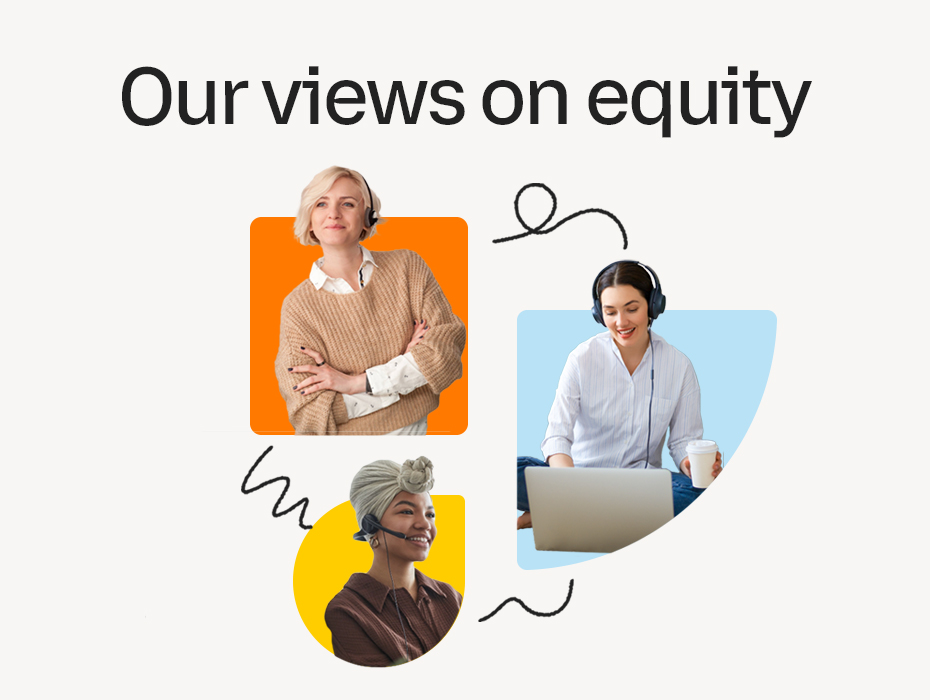As the world celebrates International Women’s Day, we reflect on what this means for us as a company and as individuals.
The theme this year focuses on embracing equity: acknowledging that every person deserves equal opportunities and treatment, regardless of their gender, race, ethnicity, religion or any other aspect of their identity. It means creating a level playing field, where no-one is held back due to systemic biases or discrimination.
While we have a strong leadership view on equity, we wanted to hear some more personal views from all levels. We asked a range of employees three key questions about embracing equity – read on to hear what they had to say. Most of the responses are anonymous as people feel more comfortable to speak openly this way.
How do you plan to embrace equity this year?
“Embracing equity is about making all facets of our professional lives a place of equal opportunity for women. It starts with equal pay as that opens the door for families to make economic decisions in an equitable way. The highest earner will always be the person that maintains their career, whilst the lowest earner may take a career break to support their family.” – Louise Newbury-Smith, UK Country Manager
“As a female solutions engineer (SE), equity for me means being treated as capable and valued for the work that I do, instead of being judged based on gender. I am very lucky to be part of the UK SE team, where we have three female SEs who are actually valued based on what we do!

– Karen Patalay, Lead Solutions Engineer, Public Sector UK
“This quote by Audre Lord really stands out for me as to what embracing equity means: ‘It is not our differences that divide us. It is our inability to recognise, accept, and celebrate those differences.’ For me, I plan to be an ally by being a mentor, advocate and trusted confidante for women in the workplace. I will ask women about their experiences and the obstacles they face, and work with them to find solutions to support them in their career.” – Emma Westland, Senior Strategic Partnership Manager, EMEA

[Continued] “I find I am at my strongest when I am part of a community that understands my needs and challenges, so my plan is to be open to opportunities to connect with others, and support their journey whilst honouring my own path.” – Natalie McGathan, Senior Customer Success Manager
“To me it means empowering, having access to opportunities and being able to act on those. As a manager I plan to keep being open and available for my team, learn of any possible way I can support their evolution, and spend as much time as is needed to answer their questions or mentor them. As a RingCentral employee, I see 2023 as a new year with new challenges and new learnings that I can’t wait to tackle.”
What these responses show is that communication is always the starting point for embracing equity. It’s essential that we all create opportunities to have honest conversations and truly listen to other people’s experiences and perspectives within the workplace.
How has hybrid work impacted workplace equity?
“Positively! Once an organisation has changed its mindset and culture to embrace a hybrid way of working, both their policies and the technology then needs to change and adapt to unlock the immense power of that newly motivated workforce. Hybrid working fosters a positive culture that is outcome oriented, which can help businesses deliver beyond their goals. That’s where we can help.” – Louise Newbury-Smith, UK Country Manager
“Hybrid work has the potential to offer a higher level of flexibility, a better work–life balance, and a more tailored employee experience. However, these can have a disproportionately positive impact on diversity, equity, and inclusion (DEI) efforts, as well as on performance for individuals. It also has the potential to create an unequal playing field and to amplify in-group versus out-group dynamics, which can flip those advantages. For workplaces already challenged to diversify and retain employees, adopting ill-conceived hybrid work models could instead speed departures, decrease inclusion, and harm performance.”

– Karen Patalay, Lead Solutions Engineer, Public Sector UK
“Hybrid work has fundamentally changed the way teams work together – from all in the office to all remote and now it’s a mix of the two. It’s been changing a lot since 2020. I think we’re now in a new format that we need to adjust to. With some people remote and others hybrid, it’ll be more complicated to keep the unity in teams, but this is not impossible. I always encourage my team to make suggestions and whenever I can, I try to organise a get together.”
To ensure workplace equity, we need to be intentional about creating an inclusive culture. This means providing equal access to resources and tools, regardless of where employees are located. We also need to ensure that remote employees have opportunities to connect and collaborate with their colleagues, and are not left out of important discussions or decision-making processes.
When you think of allyship as part of equity, what are people getting right and what are they getting wrong? Any advice for them?
Allyship is an essential component of equity, as it involves actively supporting and advocating for marginalised groups. Here’s what RingCentral employees had to say on the subject:
“A good ally will take the time to listen, without judgement, accepting that there are some experiences they will not face and cannot understand from a first-hand perspective…

– Natalie McGathan, Senior Customer Success Manager
“Often people think that building a diverse and equitable workforce is the responsibility of the HR and people teams, and of course they help set the tone for an organisation. I firmly believe it’s also the responsibility of each of us to evangelise about the amazing opportunities within our industry in order to encourage more women into it. That will give us the equal candidates for available roles. So whether you have the opportunity to speak at an event or simply to evangelise to your sister, mother, daughter or niece, make sure you tell them about all the potential they could unlock for themselves within our sector.” – Louise Newbury-Smith, UK Country Manager
“I see more and more women being given career chances, which is great. We just have to stay mindful that this should happen because of capabilities and character and not because of gender itself.” – Karen Patalay, Lead Solutions Engineer, Public Sector UK

[Continued] “As an ally, listening to different or new perspectives is an essential first step in creating effective initiatives. Whilst I believe that companies are investing in resources to train on diversity, equity and inclusion, this needs to be an ongoing programme of coaching and guidance so that we can assure we have leaders who value inclusion and whose leadership skills embrace service and collaboration.”
So it seems that everyone has the potential to be an ally. When done right, our people feel that allyship can create a sense of community and support for those who may face systemic barriers. But if it’s done without genuine intent or understanding, allyship can be merely superficial.
Final thoughts for you to take away

– Louise Newbury-Smith, UK Country Manager
Embracing equity is not just a slogan for this year’s International Women’s Day; it’s a commitment to creating a workplace where everyone can thrive. At RingCentral, we are dedicated to fostering a diverse and inclusive culture that celebrates our differences and values each individual’s contributions. We’ll continue to work towards this goal, and we are calling on everyone to join us in this effort. So, what can you do today to embrace equity?
Originally published 07 Mar, 2023, updated 17 Apr, 2023



